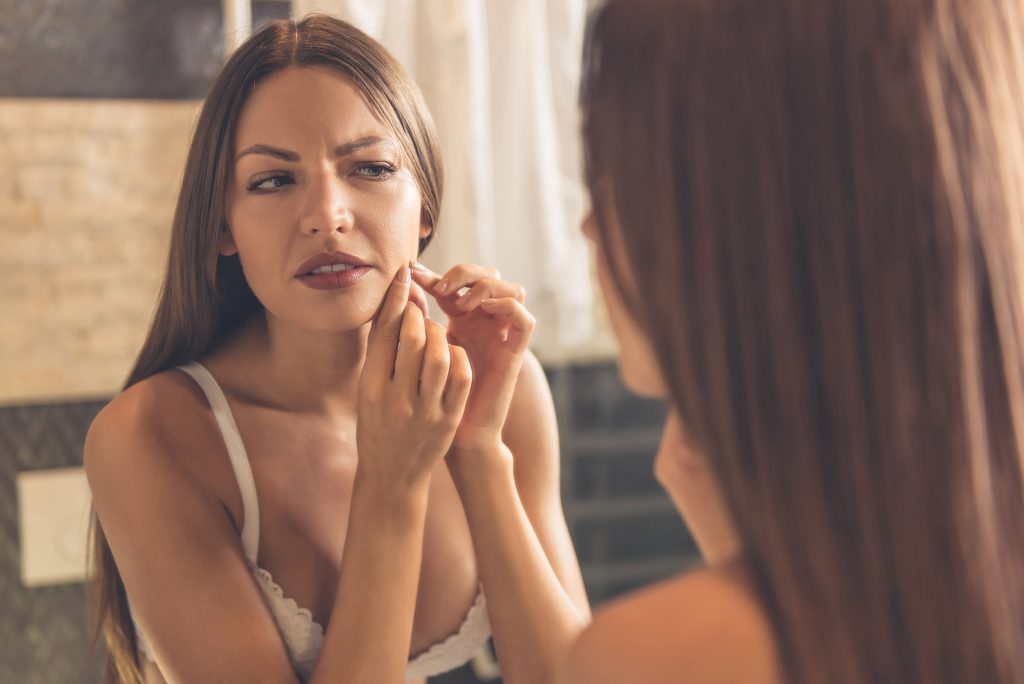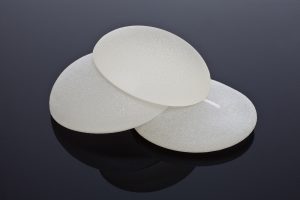
Most teens have a problem with acne which is expected to clear up when they reach adulthood, but about half of all women and a quarter of men continue to battle with acne throughout their lives.
Hormones
Hormones called androgens cause sebaceous glands to enlarge and overproduce sebum. While hormone levels even out quite a bit after puberty, menstrual cycles and pregnancy can cause spikes in androgen levels triggering breakouts. Oral contraceptives can help keep hormones in balance and prevent these sudden changes that women often experience right before their periods.
Clogged pores
Dead skin cells are constantly being sloughed off and expelled through the surface of our skin. Over-production of sebum can not only accelerate this process, but the extra sebum often traps these cells and clogs pores, allowing bacteria to get trapped and cause inflammation and pimples.
Cosmetics
Cosmetics can contribute to clogged pores, and during a breakout the normal reaction is to wear more makeup to conceal blemishes. This often makes the problem worse, but there are some things you can do to keep your makeup from contributing to acne. Noncomedogenic cosmetics are formulated to not block pores. Always use fragrance-free products to reduce the chance of irritating your skin and causing inflammation. Keep your fingers out of your makeup and wash your brushes and sponges regularly to keep bacteria out.
Hard water
Minerals in your water can make it difficult or impossible to thoroughly rinse your skin. They can promote the production of oils, and cause sebum to harden and clog pores. If you have hard water, consider using a whole house water filter and water softener. You can also choose products formulated with chelating agents which bind to the minerals so that they cannot bind to your skin.
Bacteria
Bacteria can come from unexpected sources. If you are constantly touching and “playing with” an area affected by acne you are adding bacteria and making the problem worse. Hair can also help bacteria travel to your face. Items you may not think about which come in contact with your face on a daily basis, such as pillowcases, sunglasses, and telephone handsets, should be cleaned regularly.
Over-washing and under-moisturizing
A common mistake made by acne sufferers is to scrub too hard and wash too often. This can irritate and inflame your skin, making acne even worse. People with oily skin have a tendency to avoid moisturizers. Repeatedly drying out your skin creates an imbalance which your body is constantly trying to correct by producing even more oil. Trying to correct this, by washing more and moisturizing less, creates a vicious cycle which can cause serious breakouts. You should wash your face daily, but no more than three times a day, and always use a good noncomedogenic moisturizer.
Diet
It used to be a common belief that chocolate and greasy foods led to acne. The evidence now suggests that no particular foods actually cause acne. However, your skin is your primary elimination organ. A poor diet and some medications can lead to the build up of toxins in your body which will then be eliminated through your skin, and can contribute to acne. An increase of omega-3 fatty acids and polyphenols in your diet can help reduce acne symptoms.
Stress
Stress packs a double whammy for acne sufferers. In most people, stress triggers the production of hormones, once again throwing your system out of balance and triggering the over-production of sebum. At the same time, stress compromises your immune system making it more difficult to fight the bacteria that infects clogged pores. This is why acne breakouts often occur at the worst time, right before an important social event, even in people who normally do not have acne. Drink some strong chamomile tea to help you relax, and make a little extra to use as a rinse once it has cooled. Used topically, chamomile reduces inflammation.
Adult acne is very common, but it can be resolved. If you suffer from adult acne, talk to a skin care specialist today.
Read more articles about skin care.




